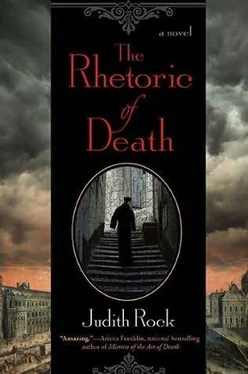Judith Rock - The Rhetoric of Death
Здесь есть возможность читать онлайн «Judith Rock - The Rhetoric of Death» весь текст электронной книги совершенно бесплатно (целиком полную версию без сокращений). В некоторых случаях можно слушать аудио, скачать через торрент в формате fb2 и присутствует краткое содержание. Жанр: Исторический детектив, на английском языке. Описание произведения, (предисловие) а так же отзывы посетителей доступны на портале библиотеки ЛибКат.
- Название:The Rhetoric of Death
- Автор:
- Жанр:
- Год:неизвестен
- ISBN:нет данных
- Рейтинг книги:3 / 5. Голосов: 1
-
Избранное:Добавить в избранное
- Отзывы:
-
Ваша оценка:
- 60
- 1
- 2
- 3
- 4
- 5
The Rhetoric of Death: краткое содержание, описание и аннотация
Предлагаем к чтению аннотацию, описание, краткое содержание или предисловие (зависит от того, что написал сам автор книги «The Rhetoric of Death»). Если вы не нашли необходимую информацию о книге — напишите в комментариях, мы постараемся отыскать её.
The Rhetoric of Death — читать онлайн бесплатно полную книгу (весь текст) целиком
Ниже представлен текст книги, разбитый по страницам. Система сохранения места последней прочитанной страницы, позволяет с удобством читать онлайн бесплатно книгу «The Rhetoric of Death», без необходимости каждый раз заново искать на чём Вы остановились. Поставьте закладку, и сможете в любой момент перейти на страницу, на которой закончили чтение.
Интервал:
Закладка:
“Oh, very comfortable,” La Reynie said wearily. “If you could hear anything other than your own emotion, you might be in better case, Maitre du Luc. I have used my power to draw a fragile circle of peace around Paris. And Versailles. I have done what I can do.”
A soft rustle of cloth made Charles realize that Pernelle had crept closer and was listening just out of sight. “Why did you have men watching the LeClercs’s bakery?” he said.
The lieutenant-general watched his men carry away Moulin’s body. Softly, more to himself than to Charles, he said, “To keep Louvois’s men away from her. He has flies in the Louvre, too.”
“To keep Louvois’s men away?” Charles said, to be sure he’d heard right. That couldn’t mean what it seemed to mean. But if it did… As he stared at La Reynie, an insane thought-or a fragile hope-reared itself in Charles’s mind. When La Reynie’s men were gone, the thought and the hope were still there. Charles began cautiously feeling his way. “Forgive me for insulting you, Monsieur La Reynie.”
La Reynie nodded slightly without looking at him.
“You have said that you are indebted to me, monsieur,” Charles said.
Another nod.
“I think you are a man who pays his debts. Even to self-righteous innocents.”
Now La Reynie was looking at him. “I pay my debts.”
Praying that his hunch was right, Charles nodded toward the wings. “My young friend needs to go to Geneva.” He heard Pernelle stifle a gasp. “Will you pay your debt, Lieutenant-General La Reynie, by helping him on his way?”
It seemed to Charles that all three of them stopped breathing for longer than should have been possible. La Reynie looked into the darkness where Pernelle stood.
“Come here,” the lieutenant-general said.
Pernelle stepped into the lantern’s light.
“Take your hat off, boy,” La Reynie said gruffly.
She looked at Charles. He nodded and she slowly removed her hat.
A soft sound escaped La Reynie. “I thought so.” His voice caught in his throat and he swallowed. “When I saw you in the bakery, you ran to the back so quickly, but I thought so. You could almost be my Marguerite’s-” He smiled at Pernelle “-brother, shall we say?” To Charles’s astonishment, he drew himself up, swept his hat off, and bowed low to her. When he straightened, he was Lieutenant-General of Paris again. “Be at the college postern before first light, boy. Accept my apology for striking you,” he said stiffly to Charles. Then he went to deal with the dead and the fragment of peace their dying had restored to his city.
Chapter 37
As Lieutenant-General La Reynie reached the edge of the stage, the man he’d sent to the Hotel de Guise came running back across the courtyard, spurs clanking. Charles went closer to hear the man’s report. He’d seen the female spy working at the house, the officer told La Reynie, and it was true that a woman had given birth there a few hours ago. In the Guise chapel, he added, with avid relish. Neither the woman nor the child had lived. Gossip in the house had it that the child was full-term.
Charles crossed himself and said quietly, “Her child was due in October, I heard.”
“So M. Doute no doubt believed,” La Reynie returned. “I suppose she would have prepared him to welcome a surprisingly large and healthy early-born babe.”
Behind them, the rector groaned. They turned around as he crossed himself and got to his feet. “May God forgive her,” Le Picart said sadly. “May God forgive us all. Monsieur La Reynie, I must call brothers to take charge of the bodies and prepare them for their graves. Will you wait in my office? We can finish saying what needs to be said there. And you, Maitre du Luc, go to your bed. You and I will talk tomorrow. You have done more than enough for us today.”
“Thank you, mon pere. Will you release Frere Fabre now? Tonight?”
“Immediately. And you will see that boy of Mme LeClerc’s home?”
When Le Picart and La Reynie were gone, Charles went to get Pernelle, who had withdrawn again into the stage wings. He wanted to have her gone before the lay brothers came for the bodies.
“Is it really true?” she whispered, grasping his hands. In the torchlight, her face was white with shock. “I thought you had gone deranged. Am I really going, and so easily? Can we trust him?”
“Yes.” Charles wasn’t sure he liked La Reynie, but he had misjudged him badly. “We can trust him.”
“I can never thank you for what you’ve done, Charles.”
“Seeing me through the show was thanks enough.” His effort at lightness was a failure. His insane gamble had succeeded and she was going. He cleared his throat and dropped her hands. “Go back to Mme LeClerc tonight, Pernelle. It’s safe. I’ll meet you outside the postern before first light.”
She looked almost as though he’d struck her. “Is that what you want?”
“You’ll be more-” He couldn’t force the lie through his tightening throat. “Please.”
She studied him for a moment. Then she drew his face down and kissed him, spun quickly away, and ran across the stage and jumped to the ground. When Charles heard the porter open and close the postern, he sighed out what started as relief and ended as desolation.
In his rooms, he shed his cassock without bothering to light the candle. He went to the window, opened the casement, and leaned out, remembering his first Paris night. There were fewer candles now in the windows up and down the street. Schools were closing for vacation, as Louis le Grand shortly would. He lifted his face to the damp air and clouded sky and wondered if there would be rain before morning. Think of rain, weather, the tragedy, the ballet, he told himself. Even of the real tragedy, whose final act had played out tonight on the stage. Think of anything but Pernelle.
He felt his way to the prie-dieu, groping like a blind man, but not because of the dark. He sank to his knees and prayed for the Doutes, living and dead, for Lisette’s dead child, for her maid Agnes waiting for her trial in the Chatelet, and the porter and the tutor. He even brought himself to pray for Guise and Moulin, because guilty and innocent alike had been brought to ruin by greed and hatred and the love of power. He turned then to giving thanks for the preservation of his own life and for La Reynie’s unexpected humanity. Finally, he prayed for Pernelle’s safe journey and that she would find her daughter and sister-in-law waiting for her. But those last prayers cost him dearly and his heart overflowed with the pain of her going. These last few days, even with their danger, exhaustion, and worry, had been so full of the happiness he’d always felt in her presence. Just knowing she was there, at Mme LeClerc’s, even when he hadn’t seen her, had lit a small, bright fire in his heart. What will I do now, he asked the Silence. Finish the school term, make my yearly Jesuit retreat, and during it make my decision about the Society? He dropped his head onto his arms. “Tell me,” he begged aloud. “I love her. What do you want of me?” The Silence held its peace. Some quality in the air, or maybe it was only his misery, made Charles feel that It was holding Its breath.
“Charles?” The door closed softly and Pernelle’s feet moved lightly across the ancient floorboards.
Charles raised his head. “What’s wrong? How did you get here?”
“Shhh.” Her fingers were warm on his lips. “Nothing’s wrong. Mme LeClerc found her stairway key; it was in a flour barrel.” She withdrew her hand and he waited, like a man in a trance. “She said spending my last night down there was a terrible waste. She said it wasn’t fair. To either of us.”
“And what do you say?” he said in a choked whisper. “What’s fair to you?”
Читать дальшеИнтервал:
Закладка:
Похожие книги на «The Rhetoric of Death»
Представляем Вашему вниманию похожие книги на «The Rhetoric of Death» списком для выбора. Мы отобрали схожую по названию и смыслу литературу в надежде предоставить читателям больше вариантов отыскать новые, интересные, ещё непрочитанные произведения.
Обсуждение, отзывы о книге «The Rhetoric of Death» и просто собственные мнения читателей. Оставьте ваши комментарии, напишите, что Вы думаете о произведении, его смысле или главных героях. Укажите что конкретно понравилось, а что нет, и почему Вы так считаете.












